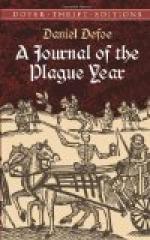Nor was this by any new medicine found out, or new method of cure discovered, or by any experience in the operation which the physicians or surgeons attained to; but it was evidently from the secret invisible hand of Him that had at first sent this disease as a judgment upon us. And let the atheistic part of mankind call my saying what they please, it is no enthusiasm: it was acknowledged at that time by all mankind. The disease was enervated, and its malignity spent; and let it proceed from whencesoever it will, let the philosophers search for reasons in nature to account for it by, and labor as much as they will to lessen the debt they owe to their Maker, those physicians who had the least share of religion in them were obliged to acknowledge that it was all supernatural, that it was extraordinary, and that no account could be given of it.
If I should say that this is a visible summons to us all to thankfulness, especially we that were under the terror of its increase, perhaps it may be thought by some, after the sense of the thing was over, an officious canting of religious things, preaching a sermon instead of writing a history, making myself a teacher instead of giving my observations of things (and this restrains me very much from going on here, as I might otherwise do); but if ten lepers were healed, and but one returned to give thanks, I desire to be as that one, and to be thankful for myself.
Nor will I deny but there were abundance of people who, to all appearance, were very thankful at that time: for their mouths were stopped, even the mouths of those whose hearts were not extraordinarily long affected with it; but the impression was so strong at that time, that it could not be resisted, no, not by the worst of the people.
It was a common thing to meet people in the street that were strangers, and that we knew nothing at all of, expressing their surprise. Going one day through Aldgate, and a pretty many people being passing and repassing, there comes a man out of the end of the Minories; and, looking a little up the street and down, he throws his hands abroad: “Lord, what an alteration is here! Why, last week I came along here, and hardly anybody was to be seen.” Another man (I heard him) adds to his words, “’Tis all wonderful; ’tis all a dream.”—“Blessed be God!” says a third man; “and let us give thanks to him, for ’tis all his own doing.” Human help and human skill were at an end. These were all strangers to one another, but such salutations as these were frequent in the street every day; and, in spite of a loose behavior, the very common people went along the streets, giving God thanks for their deliverance.




